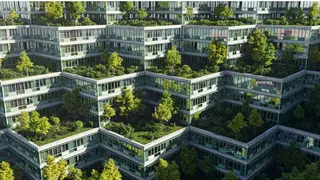It’s three years since the announcement of the Smart Cities project by the government. As various elements that go into this ambitious mission are being laced together and projects are getting into implementation mode, there are several hurdles that need to be ironed out.
Essentially, the concept of a ‘smart city’ is a framework for implementation of a modern urban hub which creates an interconnected society. The idea is to make the area citizen-centric and provide for a seamless coordination between authorities that manage the city.
However, often there is confusion about what the smart city project entails. What is not understood is that a particular project is confined to area-based development, with the potential to be replicated on a larger scale in the future. This means that the focus is on development of a particular area of a city using smart solutions to transform it into a better planned one through retrofitting and redevelopment.
It differs from pan-city development, which aims to apply smart solutions to the entire city-wide infrastructure. In the case of the smart city project, an area of 50 acres or 250 acres or 500 acres, as the case may be, is enhanced to showcase the value propositions of a smart city with the intent that the rest of the city gets inspired to make alterations in its own existing localities, areas and communities of similar nature, allowing the rest of the city to evolve with smart practices.
Though the Smart Cities Mission promises tremendous opportunity to improve life in the urban hubs of the country, in this initial phase it is the IT related and Internet of Things aspect that has gathered pace. It would need at least three more years to find its feet.
The funding aspect
The Central government had earmarked ₹48.000 crore under the Smart Cities Mission and released ₹9,939 crore. Against this, 753 projects worth ₹24,511 crore are under development. Further, about 287 projects worth ₹14,296 crore are in tendering stage.
“The progress in terms of execution is faced with hurdles and challenges. Cities like Surat and Visakhapatnam have made strides,” says Pratap Padode, Founder Director, Smart Cities Council India.
Discussing how projects are gathering momentum, Padode explains, “Work has been completed on 243 projects so far, worth ₹4,583 crore. Furthermore, work orders have been issued on 510 projects worth ₹19,928 crore. Detailed project reports have also been approved for 60 projects worth ₹3,659 crore, and DPRs for more than 2,000 projects worth about ₹1,00,177 crore are under preparation.”
The Ministry of Housing and Urban Affairs, in January this year, added a final lot of cities to the Smart Cities Mission, thus completing the list of 99 smart cities in India. Of these 99, 86 have incorporated Special Purpose Vehicles and 62 have procured project management consultants to kick-start their projects.
Consequently, various cities are making strides to implement smart solutions, and connect their citizens digitally. But though the groundwork has well and truly been laid, the progress has been slow, and many projects are still in the planning stage.
Furthermore, a lack of urban planners in the country has contributed to the slow pace. The country may not finish transforming 99 cities into smart cities by 2020, but the mission to provide smart technology coverage to 99 cities across the country is right on track, feels Padode.
Better civic infrastructure
M Gautam Reddy, Managing Director of Ramky Enviro Engineers Ltd, agrees that the focus thus far has been on IT-based smart solutions covering Internet of Things, technology solutions for better management. “But the real smart solution will be when we transform the civic infrastructure covering good quality of water supply, ensuring that people have good quality of air to breathe, cities have solid waste management and improve the city environmentally, which gives citizens better quality of life. We are at least 3-4 years from achieving this,” he reckons.
Taking the argument forward is S Karthikeyan, Principal Counsellor, CII-Sohrabji Godrej Green Business Centre. “Our focus is on working closely with government and municipal bodies towards ‘green smart cities’. As of now, the focus is on technology, but we believe real change will come when we transform cities into better cities with good quality air, water and better lung space. We are working with the upcoming city of Amaravati, Lucknow, Dholera City and GIFT City (the latter two are not part of the mission)”.
“A number of start-ups are coming up with innovative solutions for smart cities and though there is a clear momentum, it will take 3-5 years to fructify,” says Jayant Kohale, Business Head, Smart Infrastructure, RPG Enterprises. “Significantly, it is interesting to note that cities are taking to cloud-based solutions”
Thus far, smart city projects have focused on investment in infrastructure and transport projects, followed by mobility, water and energy initiatives.
In contrast, education, smart health and smart safety projects have received the least investment.
Lacunae in the mission
There are other downsides as well. Having been used to a relationship of doling out grants to cities and its citizens, the government has grown too accustomed to not being accountable, and not having to be questioned on quality of delivery, says Padode.
“Due to their ambitious Smart Cities Mission, they now have to come up with sustainable solutions and be accountable for them. This requires a change in mindset. Secondly, even if the mindset underwent a change, capacity-building remains a huge hurdle,” he warns.
Finance remains another huge obstacle, especially in light of the heavy focus on public-private partnership (PPP) model to fund projects.
A couple of municipalities like Pune and Hyderabad, though, have managed to raise funds through bond offerings. The Energy Efficiency Services Limited, under the Street Light National Programme, has also managed to implement a number of projects across the country in league with local municipalities and public-sector utilities.
According to the Centre, while there has been good response from some States, others have not shown much enthusiasm to take up projects. Municipal bodies, too, need to revamp before getting into such projects as many of them lack the basic capacity.








Comments
Comments have to be in English, and in full sentences. They cannot be abusive or personal. Please abide by our community guidelines for posting your comments.
We have migrated to a new commenting platform. If you are already a registered user of TheHindu Businessline and logged in, you may continue to engage with our articles. If you do not have an account please register and login to post comments. Users can access their older comments by logging into their accounts on Vuukle.